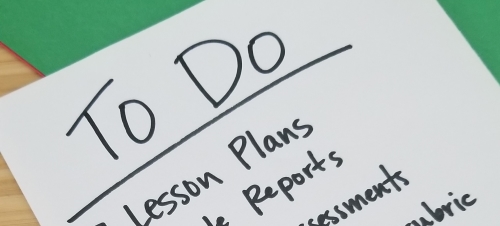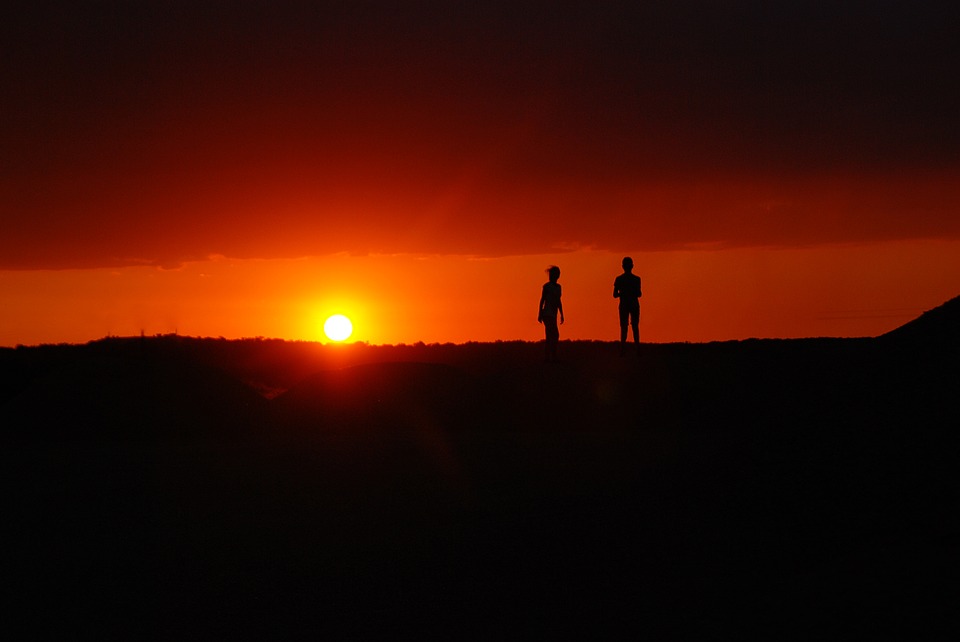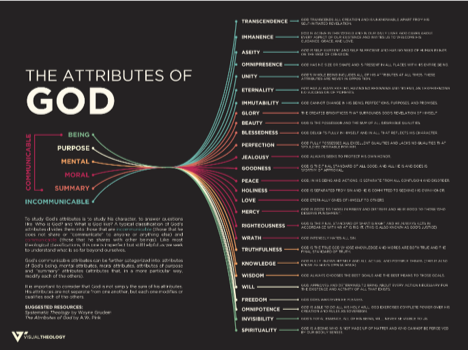Confessions of a Stressed-Out Teacher
I took a break from my teaching at one point to pursue further studies. While studying, I worked part-time as a waiter. I missed many things about the teaching environment: interacting with colleagues, watching students learn, preparing for class, and sometimes even grading. Yet, there was one thing I did not miss at all: I NEVER had to take work home!

Perhaps taking work home simply comes with the territory. As teachers, we are concerned about our students’ well-being and look for ways to make their learning experience better. We often have assignments to grade and materials to prepare for tomorrow’s class.
While several good things may come out of all this hard work, there is also a side-effect: we’re worn out. And when we’re worn out, we lose the joy of teaching and become less effective at what we do. We get more impatient, irritable, and bitter, displaying character traits that resemble the works of the flesh more than the fruit of the Spirit.
I decided to write on this because, more than anything, this pandemic has left me tired. I’ve seen many teachers tired as well. So, what can be done?
The biblical answer is Sabbath-keeping, not as a rule but as a day to rest. In the Old Testament, the people of Israel were directed to separate a day dedicated to rest and worship every seven days. The word “Sabbath” comes from a Hebrew word derived from the verb “to stop” (shabat), which sounds similar to the number seven in Hebrew.
In the fourth commandment (Exodus 20:8–11), we read that we were created to work, but also to rest. Keeping a Sabbath is not a random command, for the rhythm of work and rest is embedded in the created order. God rested after He had completed making the heavens and the earth (Genesis 2:2–3). On one hand, He was expressing the satisfaction we also experience after successfully accomplishing a task or project. On the other, there was still much work yet to be done! After all, God delegated to us the ruling over creation, the filling of the earth, the tilling of the ground, and the naming of the animals. So I wonder, if God didn’t do everything that could have been done, why do I have the urge to act as if everything is up to me?
Interestingly, in the other version of the Decalogue (Deuteronomy 5:12–15), there’s a different reason for Sabbath-keeping. Here, the practice is grounded on God’s redemptive work of setting Israel free from under Egypt’s thumb. Having experienced God’s grace, Israel was not to act in oppressive ways. Not only was the head of the household entitled to rest, but also his children, servants, foreigners that worked for him, and even his animals. Everyone was entitled to catch their breath (Exodus 23:12). I wonder, how often is my drive for effectiveness making my students stressed?
In New Testament times, Sabbath-keeping became distorted. The Pharisees, through their misguided understanding, managed to change what was meant to be a source of joy and refreshment into a legalistic burden. They believed they couldn’t walk more than 500 yards to visit a friend or start a fire to cook a meal on a Sabbath. Jesus corrected them by saying “The Sabbath was made for man, not man for the Sabbath” (Mark 2:27). Having a day of rest is not a rule we obey to please God; it is a gift we receive from Him. It makes me ask: is my lifestyle a source of stress and tension, or a fountain of blessing and grace to the people around me?

In the Hebrew mindset, a day was not from midnight to midnight, but from sunset to sunset. When we wake up to go to work, we are not starting anything, but merely joining God in what He’s already doing. God is always at work in the world, even while we sleep (Psalm 127:2). Perhaps, our rhythm should not be seen as work-then-rest, but as rest-then-work. We can only properly work when we are well-rested in our Father’s arms. Taking this into consideration, does my reluctance to having proper rest reveal my lack of faith and dependence on God?
So what can we do to establish a healthier life rhythm? First, we must realize that Sabbath-keeping is a weekly rhythm. Vacation time is important, but we must also create resting spaces in our weekly planners.
Second, we need to acknowledge different kinds of rest. I need time to rest…
- my spirit, by taking time to connect to the Spirit of God individually and with my brothers and sisters;
- my body, by getting enough sleep and having proper physical posture at work (and if you lead a sedentary lifestyle like me, physical rest might also mean exercising a few times a week);
- my mind, by slowing down my thoughts and not thinking about my work all the time, and by disconnecting from the constant stimuli of social media, music, online meetings, group chats, etc.
Finally, resting is not only about not doing things, but also about doing different things. It’s about going on a hike and enjoying God’s creation, or developing your creative or artistic side through a hobby, or taking time to visit a friend you haven’t seen in a while.
Slowly I’m learning that God has called us to work, but not to be stressed. I guess I’ll stop here and have some rest.
Raphael Haeuser
Educational Consultant
TeachBeyond, Brazil
Photo Credits:
Teacher’s To-Do List. E. Burnham
Working Overtime. Piqsels.com
Sunset. E. Burnham



 become all that God intends. And one of the things God intends is for us to be like him. “Be holy because I, the Lord your God, am holy.” (Lev 19:2) Holiness is one of our core values: “Valuing the moral perfection of God, we pursue a life of purity as He instructs us to in His Word and enables us to live through His indwelling Spirit.”
become all that God intends. And one of the things God intends is for us to be like him. “Be holy because I, the Lord your God, am holy.” (Lev 19:2) Holiness is one of our core values: “Valuing the moral perfection of God, we pursue a life of purity as He instructs us to in His Word and enables us to live through His indwelling Spirit.”











 Accept the challenge to join colleagues in thinking hard, discussing often, and praying fervently about this all too common stumbling block around suffering. How can we prepare our students with a theology of suffering that equips them to stand firm in the faith even when faced by “trials and tribulations of many kinds ” (5)? How can we facilitate discussions surrounding prayer that avoid the “Cosmic Sugar Daddy” trap? What messages are our lives sending to our students—both explicitly and tacitly—about suffering and disappointed expectations?
Accept the challenge to join colleagues in thinking hard, discussing often, and praying fervently about this all too common stumbling block around suffering. How can we prepare our students with a theology of suffering that equips them to stand firm in the faith even when faced by “trials and tribulations of many kinds ” (5)? How can we facilitate discussions surrounding prayer that avoid the “Cosmic Sugar Daddy” trap? What messages are our lives sending to our students—both explicitly and tacitly—about suffering and disappointed expectations?

 about God restoring us – and through us others and His creation – as His image in Christ, who is the perfect image of God.
about God restoring us – and through us others and His creation – as His image in Christ, who is the perfect image of God. Howard Dueck (MA, Biblical Counselling), together with his wife Eileen, began their service with TeachBeyond in 1988 in Brazil, where Howard taught, counselled and was involved in leadership at the Gramado Bible College. He continued counselling and teaching when they moved to Germany. He is currently based near Winnipeg, Canada, and serves as the TeachBeyond regional director for Latin America and director for Beyond Borders (TeachBeyond’s education outreach to displaced persons).
Howard Dueck (MA, Biblical Counselling), together with his wife Eileen, began their service with TeachBeyond in 1988 in Brazil, where Howard taught, counselled and was involved in leadership at the Gramado Bible College. He continued counselling and teaching when they moved to Germany. He is currently based near Winnipeg, Canada, and serves as the TeachBeyond regional director for Latin America and director for Beyond Borders (TeachBeyond’s education outreach to displaced persons).
 For me, this happened last weekend as I watched a biopic called Queen of the Desert. I was fascinated by the life of Gertrude Bell (3rd from right), a Victorian debutante who ended up traversing Arabia and influencing the national borders post-Ottoman Empire. How had I never heard of this woman, this maker of kings? After all, I lived in that part of the world for four years. As soon as the movie ended, I had my phone out, researching to see how much of what I’d just seen was based in fact. I’ve now got my eye on a book of her letters that I’m hoping to find in the library on my next trip. My curiosity has been whetted; I’m eager to learn more.
For me, this happened last weekend as I watched a biopic called Queen of the Desert. I was fascinated by the life of Gertrude Bell (3rd from right), a Victorian debutante who ended up traversing Arabia and influencing the national borders post-Ottoman Empire. How had I never heard of this woman, this maker of kings? After all, I lived in that part of the world for four years. As soon as the movie ended, I had my phone out, researching to see how much of what I’d just seen was based in fact. I’ve now got my eye on a book of her letters that I’m hoping to find in the library on my next trip. My curiosity has been whetted; I’m eager to learn more. As teachers, we are privileged to spend a majority of our waking hours walking and living among our students.
As teachers, we are privileged to spend a majority of our waking hours walking and living among our students.
 more surprisingly, I can still recount the first time I worshipped God in class. It was Biology 101. We were learning about the human body, and as I learned how this system worked with that system, I marvelled at the complexity and beauty of it all. I began to feel my heart lean toward Heaven. “What a wonderful Creator!” I wanted to yell. I did restrain myself, but that is the day I decided to be a science teacher. I wanted to share that amazing experience with students so that they too could worship our wise God in the middle of class.
more surprisingly, I can still recount the first time I worshipped God in class. It was Biology 101. We were learning about the human body, and as I learned how this system worked with that system, I marvelled at the complexity and beauty of it all. I began to feel my heart lean toward Heaven. “What a wonderful Creator!” I wanted to yell. I did restrain myself, but that is the day I decided to be a science teacher. I wanted to share that amazing experience with students so that they too could worship our wise God in the middle of class. And how much fun it is to do this with students!
And how much fun it is to do this with students! What I hadn’t connected on my own was the way that balancing chemical equations was actually a reflection of God’s character. You see, one side of the equation has to balance with the other side. In a chemical reaction, nothing can be created or destroyed, it just changes form. Through her book I came to see that John 1:3 was describing this very law of nature, “Through him all things were made; without him nothing was made that has been made.” We can balance equations because nothing can be created or destroyed without God. He is the Transcendent Law Giver. As this truth hit me, I was able to lead my students to it the next day with questions like, “Why can we balance equations? Does this work every time? What if we could create and destroy matter? Who is the only one that can create and destroy?” In those few moments we were able to discuss and reflect on the character of God and hopefully that led to worship. I was recounting just how powerful and wise is our God. I can tell you I was worshipping!
What I hadn’t connected on my own was the way that balancing chemical equations was actually a reflection of God’s character. You see, one side of the equation has to balance with the other side. In a chemical reaction, nothing can be created or destroyed, it just changes form. Through her book I came to see that John 1:3 was describing this very law of nature, “Through him all things were made; without him nothing was made that has been made.” We can balance equations because nothing can be created or destroyed without God. He is the Transcendent Law Giver. As this truth hit me, I was able to lead my students to it the next day with questions like, “Why can we balance equations? Does this work every time? What if we could create and destroy matter? Who is the only one that can create and destroy?” In those few moments we were able to discuss and reflect on the character of God and hopefully that led to worship. I was recounting just how powerful and wise is our God. I can tell you I was worshipping!
